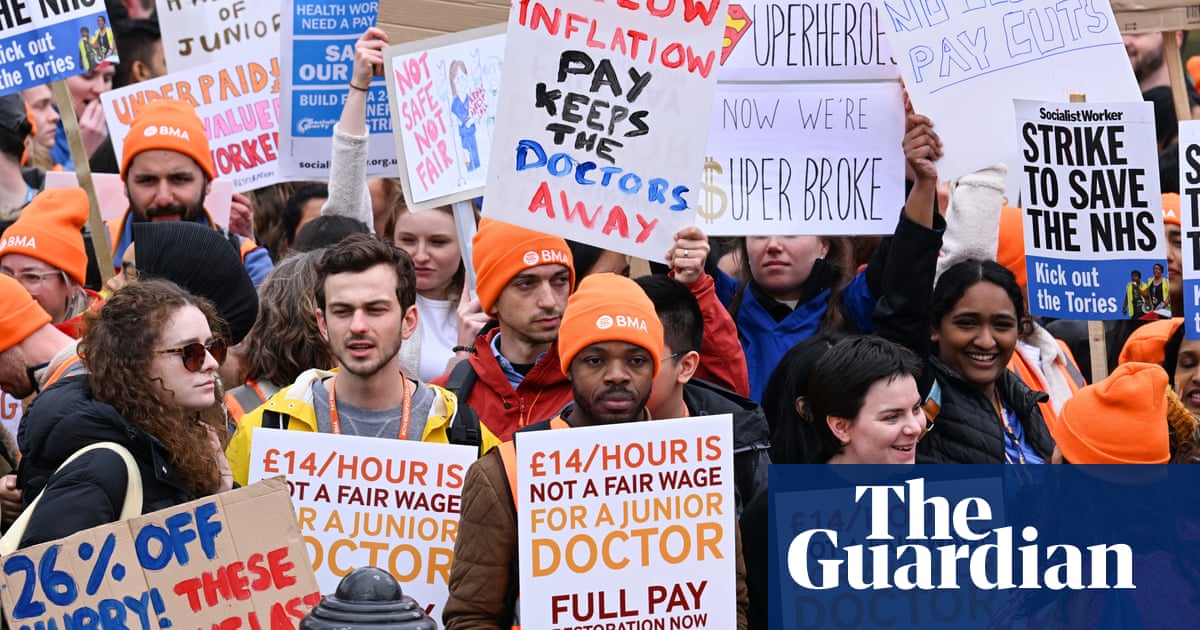
The four-day junior doctors’ strike beginning on Monday across England will result in an estimated 350,000 appointments, including operations, being cancelled, with experts raising fears for patient safety.
Three junior doctors share their views on the strike and whether they will join the picket line or not.
‘I look after 70 patients per shift for £10.71 per hour’
I am a Foundation Year 1 doctor working in Greater London. I’m in my first year of work following six years training at medical school, from which I gained over £84,000 of debt with an interest rate of 6.9%, and two degrees.
Last month, my average hourly take-home pay, including additional pay for nights, weekends and evenings, but after deductions for tax, student loan, NI, and pension, was £10.71 an hour. In London. My hourly daytime rate before deductions is £14.09. I get a payment of £12.42 per month to offset the cost of living in London. For context, my rent is £19,500 per annum excluding bills for a small one-bedroom flat, which I split with my husband.
This weekend I was the sole doctor looking after around 70 patients – and that is at full staffing levels without any rota gaps or colleagues calling in sick – both very common occurrences. I assessed an elderly, frail patient and made the difficult call to stop their active treatment and put them on an end-of-life pathway. I read ECGs, assessed patients with low and high heart rates, new shortness of breath, aches and pains. I put in cannulas and took bloods, requested X-rays and interpreted the results. I prescribed all the medications and fluids needed for my 70 patients.
A more experienced junior doctor, a registrar, was available to advise me over the phone if I had any issues or needed confirmation that my plans for patients were sensible, but largely the work was done independently. I didn’t see or speak to a consultant all weekend.
Being a junior doctor is a huge responsibility with huge consequences if you make a mistake. Despite the love I have for my job, I don’t think it’s a fair wage. Next year my pay will go up by £2.22 per hour, before tax and other deductions, and with it will come a further increase in responsibility. Joining the picket line is a last stand. We just have to hope that the government listens.
Sarah, a junior doctor from London
‘I fear doctors risk harming the respect their profession has built up over so long’
I have not, and will not, strike with my colleagues. The [British Medical Association’s] claims don’t stand up to scrutiny. Its headline figure of a 26% fall in pay since 2008-09, which builds the basis for the demand for a 35% pay rise, is based on implausible assumptions.
The Nuffield Trust calculates a fall in pay closer to the region of 8% up to 2021-22 based on analysis of actual earnings on more plausible assumptions. It also doesn’t account for the fact that so many junior doctors are now given the option to – and do – work less than full-time, often taking up virtually boundless opportunities to pick up additional shifts at relatively high locum rates.
Even if the BMA’s claims had merit, I cannot ignore that in two years, in the sixth year of my career and before I turn 30, I can readily earn six-figure sums. This is the trajectory that around half of junior doctors take. Yes, those F1 [the first year of training after finishing medical school] payslips are only just in the region of the national median pay, but I currently earn in the region of £55,000, and that’s before locum shifts.
I cannot in good conscience try to acquire an even greater share of taxpayer money. My work is interesting, fulfilling, well respected, and frequently fun. I would quite willingly do this job for less.
I fear doctors risk harming the respect their profession has built up over so long by using patients as leverage against the government. Even the idea that this is about patient safety seems to have been dropped since the last strikes in 2016. I think it’s inevitable that there is going to be some degree, possibly even a high degree, of unnecessary suffering.
Daniel Hart, 27, a junior doctor in his first year of GP specialty training, from Runcorn
‘I’m striking for those who will come after me’
I’m dreading going on strike. I work in a community mental health team and during the strikes in March I spent the three days on the picket line worrying about the patients who would not be reviewed due to our absence. I had nightmares that the patients’ mental states had deteriorated, leading to them killing themselves or being sectioned. I’ve worked late every day last week to ensure that my patients will be safe.
I know I’m not alone in feeling like this. No one wants to go on strike, but sadly it’s the least bad option in this workforce crisis. Staffing levels are so poor that there have been shifts in my trust where only one out of three rotas has a doctor working. I’ve had colleagues move to Australia, or venture into pharmaceuticals and finance.
I’m striking not so much for myself, because I’ve only got two years until I’m a consultant. It’s because of the people coming after me. I worry that when I’m a consultant I’ll have hardly any junior colleagues because many will have gone abroad if pay and working conditions aren’t improved.
The government talks about increasing the number of medical school places, but basic life support principles dictate that you try to stem bleeding before giving an infusion. They need to stop the NHS haemorrhaging staff, before it’s too late.
Dominic, 31, a specialist registrar in general adult psychiatry, from London
https://news.google.com/rss/articles/CBMiXGh0dHBzOi8vd3d3LnRoZWd1YXJkaWFuLmNvbS9zb2NpZXR5LzIwMjMvYXByLzEyL2p1bmlvci1kb2N0b3JzLXZpZXdzLWZvdXItZGF5LXN0cmlrZS1lbmdsYW5k0gFcaHR0cHM6Ly9hbXAudGhlZ3VhcmRpYW4uY29tL3NvY2lldHkvMjAyMy9hcHIvMTIvanVuaW9yLWRvY3RvcnMtdmlld3MtZm91ci1kYXktc3RyaWtlLWVuZ2xhbmQ?oc=5
2023-04-12 06:53:00Z
1908933651
Tidak ada komentar:
Posting Komentar